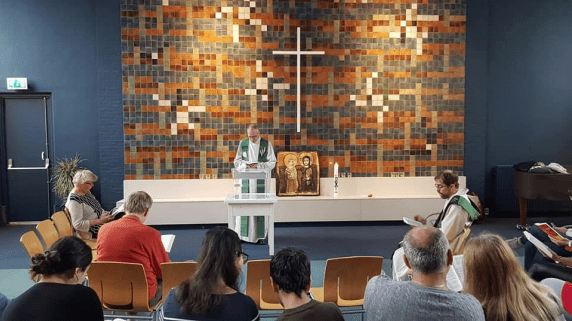A church service in The Netherlands has been going on for more than 700 hours, or over a month, to prevent an Armenian refugee family from being deported. And the end is not yet in sight.
Pastors from all over the country are taking turns leading services at Bethel Church in The Hague, day and night, to prevent an Armenian family being picked up by officials, who by law are not allowed to enter places of worship during religious services. When one pastor finishes his shift, he passes a lighted candle to the next and the service continues unbroken, with sometimes only a handful of people in the congregation.
The Tamrazyan family – Sasun, Anousche and their three children, Hayarpi, Warduhi, and Seyran – fled their native Armenia nine years ago after Sasun’s political activism earned him death threats. They sought asylum in The Netherlands, where a judge granted the family asylum but the government succeeded in having the ruling overturned.
The family then applied for a children’s pardon – a rarely granted permit which allows refugees with children who have lived in The Netherlands for more than five years to stay – but their application was refused.
When the Tamrazyan family found out about the deportation order against them, they reached out to Protestant congregations in The Hague to ask for help. With the support of the national leadership of the church, Bethel Church took them in on October 25, and the Tamrazyan family has been there ever since. The family alternate their time between the chapel and accommodation in the top of the building – going outside is not possible.
The family remains buoyed by the support shown by the church. Anousche Tamrazyan comments: “It is impossible to express how special it feels when so many people help you.”
“We knew it would be a long-term church service, that we could sit here for weeks if not months.” – Theo Hettema
A church spokesperson says: “We do what we always do: a church service, but then continuously – just as the need to be supported is continuous. We do this to encourage this family, to show that we are there as a church, that there is a God who does not let anyone fall.”
Theo Hettema, chairman of the general council of the Protestant Ministers, says the church wants to “create time and space for dialogue with the government about a dilemma that … should not be faced by a church: choosing between respect for the government and protecting the rights of a child.
“When we started, we knew it would be a long-term church service, that we could sit here for weeks if not months,” says Hettema.
“We do not have any illusions. It may end with vans of the Repatriation and Departures Service out front, or may end because we can no longer continue the service. But that was not reason not to do it. If a family knocks and asks, ‘Can you help us with a church service, you do not hold a signature action.”
As far-right anti-immigration movements have gained popularity in The Netherlands, the country’s harsh asylum laws have caused controversy and created a tense climate for refugees. But the Tamrazyans are seeing a different side of the country, with hundreds of people visiting Bethel Church to show their support and more than 300 pastors volunteering to lead services.
The church has invited prayer for itself, for the Tamrazyan family and for the 400 children in the same situation in The Netherlands.
Email This Story
Why not send this to a friend?


